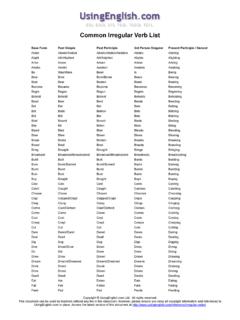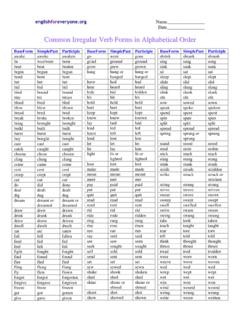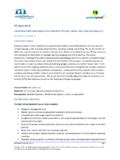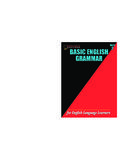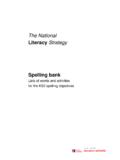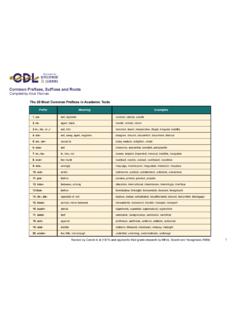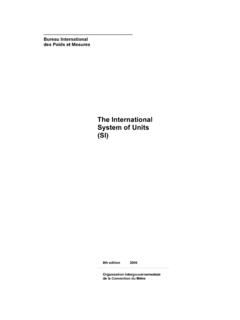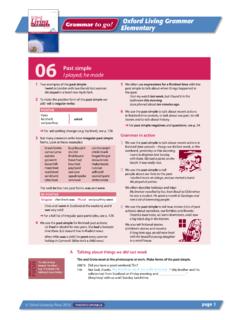Transcription of 1 - Daily Grammar
1 - 1 - - 1 - Table of Contents Section 1: Parts of Speech .. 3 Chapter 1: Verbs .. 5 Chapter 2: 17 Chapter 3: Pronouns .. 21 Chapter 4: Adjectives .. 31 Chapter 5: 45 Chapter 6: Prepositions, Conjuctions, & Interjections .. 65 Chapter 7: Parts of Speech Review .. 79 Section 2: Parts of the Sentence .. 85 Chapter 8: Subjects and Verbs .. 87 Chapter 9: Predicate Nominatives .. 97 Chapter 10: Direct Objects .. 105 Chapter 11: Review of Subjects and Verbs, Predicate Nominatives, and Direct Objects .. 113 Chapter 12: Transitive and Intransitive Verbs .. 119 Chapter 13: Appositives .. 133 Chapter 14: Nouns of Address .. 139 Chapter 15: Pronouns Revisited .. 145 Chapter 16: Noun/Pronoun Review .. 159 Chapter 17: Adjectives Revisited .. 167 Chapter 18: Adverbs Revisited .. 179 Chapter 19: Prepositional Phrases .. 195 Chapter 20: Indirect Objects .. 209 Chapter 21: Objective Complements .. 215 Chapter 22: Conjunctions Revisited.
2 219 Chapter 23: Verbals .. 227 Chapter 24: Compound Sentences .. 267 Chapter 25: Adjective Clauses .. 275 Chapter 26: Adverb Clauses .. 287 Chapter 27: Noun Clauses .. 299 Chapter 28: Clauses Review .. 303 Chapter 29: Sentence Variety .. 317 Chapter 30: Compound Sentences .. 325 Section 3: Mechanics .. 339 Chapter 31: Capitalization .. 341 Chapter 32: End Punctuation .. 365 Chapter 33: Periods .. 369 Chapter 34: Commas .. 375 Chapter 35: Quotation Marks .. 399 Chapter 36: Semicolons .. 409 Chapter 37: Colons .. 415 Chapter 38: Italics & Underlining .. 423 Chapter 39: Apostrophes .. 427 Chapter 40: Hyphens .. 439 Chapter 41: Dashes .. 447 Chapter 42: Parentheses .. 451 Chapter 43: Brackets & Slashes .. 455 Glossary .. 459 Index .. 467 - 2 - - 3 - Section 1: Parts of Speech - 4 - - 5 - Chapter 1: Verbs Verbs show action or state of being. Lesson 1 Verbs are the most important words in a sentence.
3 Verbs are the first of the eight parts of speech that we will be studying. Most verbs are action words, but a few verbs indicate state of being or existence. The first lessons will be about verbs, and how they are recognized and used. Instructions: Find the action verbs in the following sentences. 1. The wolf ran across the sand. 2. Sit down. 3. The dog barked at the man. Answers: 1. ran 2. sit 3. barked All three verbs are action verbs since they show action. Action verbs are the most common verbs. Lesson 2 Instructions: Find the state of being verbs in these sentences. 1. My uncle is a pilot. 2. The pie looks good. 3. You seem upset. Answers: 1. is 2. looks 3. seem These verbs are state of being or linking verbs. Some common linking verbs include: is, am, are, was, were, be, being, been, seem, look, feel, and become. They do not show action; they just show that something exists.
4 - 6 - Lesson 3 Instructions: Pick out the verbs in these sentences and tell whether they are action verbs or linking verbs. 1. Suddenly someone sneezed loudly. 2. There are holes in my shirt. 3. He appears happy. 4. The image appeared in the mirror. Answers: 1. sneezed 2. are 3. appears 4. appeared Sneezed and appeared are action verbs. Are and appears are linking, or state of being verbs. Some verbs, like appear, can be either action or linking verbs (this depends on whether the verb shows action or not). In the sentence above, appears is like saying seems, which shows no action. However, appeared shows the action of the image. Lesson 4 Sometimes a verb can be more than one word. When a verb is more than one word, it is called a verb phrase. verb phrases can be two, three, or four words. Using auxiliary or helping verbs makes verb phrases. There are twenty-three (23) helping verbs that should be memorized since they are used so often.
5 If you memorize them, it will make knowing and understanding verbs much easier. They are usually grouped in the following five groups: Group 1: is, am, are, was, were, be, being, been Group 2: has, have, had Group 3: do, does, did Group 4: shall, will, should, would Group 5: may, might, must, can, could Instructions: Pick out the verb phrases in these sentences. 1. You are going to Seattle. 2. You have been resting too much. 3. We must be early. 4. I will be finished shortly. Answers: 1. are going 2. have been resting 3. must be 4. will be finished These sentences all have what are called auxiliary or helping verbs. I will refer to them as helping verbs. - 7 - Lesson 5 Some of the helping verbs can be used alone as the main verb . Is, am, are, was, and were can be used alone as linking or state of being verbs. Has, have, had, do, does, and did always show action when used alone. Be, being, and been can be used with other verbs either to show action, or state of being.
6 The other helping verbs cannot be used alone, but only as helping verbs. Instructions: Find the verb or verb phrases in these sentences. 1. She has too many friends. 2. You do beautiful work. 3. I was in Canada last week. 4. You are being very stubborn. Answers: 1. has 2. do 3. was 4. are being Has and do are action verbs, was and are being are state of being verbs. Quiz for Lessons 1 - 5 Instructions: List the verbs or verb phrases in the sentences, and tell whether they are action verbs or state of being verbs. For extra credit, find the helping verbs. 1. Jim plays basketball. 2. They will return on the airplane. 3. Badger is a funny dog. 4. I have been here a long time. 5. I should have been playing the drum. 6. Go home. - 8 - Answers for Quiz (Lessons 1-5): 1. plays - action 2. will return - action 3. is - linking or state of being 4. have been - state of being 5.
7 Should have been playing - action 6. go - action The helping verbs are: will, have, should, have, and been. The been in sentence four is not a helping verb because it is the main verb . The last verb in a verb phrase is always the main verb . Lesson 6 Instructions: Pick out the verb phrases in the following sentences (remember to watch for the helping verbs). 1. I can understand his concern. 2. She must have told you ten times. 3. We shall go tomorrow. 4. The wind was howling all night. Answers: 1. can understand 2. must have told 3. shall go 4. was howling Can understand, must have told, shall go, and was howling are the verb phrases. - 9 - Lesson 7 The use of helping verbs causes certain changes in verb phrases that we need to be able to recognize. One change is the use of contractions (contractions are two or more words combined together with an apostrophe).
8 As mentioned before, it s a good idea to memorize the helping verbs. If you haven t memorized them, take a few minutes to learn them. Group 1: is, am, are, was, were, be, being, been Group 2: has, have, had Group 3: do, does, did Group 4: shall, will, should, would Group 5: may, might, must, can, could Instructions: List the contractions in the following sentences. 1. I've done it again. 2. You aren't going with us. 3. She's staying to tend the kids. Answers: 1. I ve 2. aren t 3. she s Lesson 8 A helping verb may be connected with another word in a contracted form. The following sentences have verb phrases using contractions. Instructions: Find the verb phrases in each sentence. Determine if the verb phases are action verbs or state of being verbs. 1. I've done it again. 2. You aren't going with us. 3. She's staying to tend the kids. Answers: 1. 've (have) done - Have is in contracted form.
9 2. are going - Are is connected to the contracted form of not. 3. 's (is) staying - Is is in contracted form. All three verb phrases are action verbs. - 10 - Lesson 9 In sentences that are questions, the verb phrase is often separated by another word. Instructions: Find the verb phrases in these sentences. Be sure to watch for another word separating the helping verb from the main verb . 1. Have you been driving long? 2. Where was the car parked? 3. Can I be of assistance? Answers: 1. have been driving 2. was parked 3. can be The words separating the verb phrases are nouns and pronouns. This is very common in sentences that are questions. The first two verbs are action verbs, and the last verb is a state of being verb . Lesson 10 Sometimes verb phrases are separated by words called adverbs (we will learn more about adverbs in later lessons). Adverbs are often used with verbs; however, they are not considered part of the verb phrase.
10 Instructions: Find the verb phrases in the following sentences. Are the verbs action verbs or state of being verbs? 1. You have not helped your father today. 2. I will soon be home. 3. The child had suddenly choked on the food. Answers: 1. have helped - action verbs 2. will be - state of being verbs 3. had choked - action verbs - 11 - Quiz for Lessons 6 - 10 Instructions: List the verb phrases in the following sentences. 1. My wife is reading in the hammock under the tree. 2. The message can't be altered. 3. Somewhere a party is being planned. 4. Shouldn't I be a clown for Halloween? 5. I've run out of time. 6. Write down as many of the twenty-three helping verbs as you can. - 12 - Answers for Quiz (Lessons 6-10): 1. is reading 2. can be altered 3. is being planned 4. should be 5. 've (have) run 6. The twenty-three helping verbs are: is, am, are, was, were, be, being, been, have, has, had, do, does, did, shall, will, should, would, may, might, must, can, and could.

